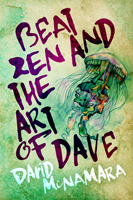B
‘I’m fine-loss of appetite is all,’ Bill said.
‘What dear?’ Stacey asked. Her practised sincerity tinkled of wine.
‘Did you ask if I was alright?’
‘No. Are you okay dear?’
‘The old man is starting to hear voices.’
‘Yeah old man, who the fuck gives a shit about your feelings?’
Bill’s vacant glare reluctantly shifts to the attention of his two sons. Who said what? Bill didn’t know. He found them hard to tell apart these days. Bradley and Mitchell, or was it Mitchell and Bradley – Bill didn’t really care. They sat grinning like a spiteful pair of baboons.
‘Now, now boys – help your father finish his sausages and chips if you’re still hungry.’
Forks raised like spears, Bill feels a primal need to defend something stir deep within. He picks his own set of cutlery off the plate in a lame show of defiance.
‘Fuck off old man.’
‘The problem with you dad is you’ve got no balls – you’re a fucking geezer.’
Bill’s dinner is swiftly savaged and the vitriolic tirade resumes back and forth across the table. Bill’s ears go numb – even to the weak sound of his voice as he tunes in to the rain falling calmly outside.
Bradley and Mitchell found in their father a common enemy to unleash their venomous adolescent hostilities. Bill was caught a year ago having an affair with Joan, one of Stacy’s good friends who had been divorced for three years. In reality it was more of a fling than an affair and Bill wasn’t caught. Joan told Stacey the next day.
Bill lost relatively nothing in the incident. He wielded little respect before his indiscretion. He only gained more sustained and spiteful attacks from his sons. Bradley and Mitchell were so rotten, it was molecular and Bill reconciled, despite what he did or didn’t do, chances are they were always going to turn out this way. He knew Stacey wouldn’t leave – she had nowhere to go.
The evening is washed away with the bottle and a half of Barbera Bill drunk at dinner. He finds himself alone in a dark kitchen. The crack and tinkle of ice in his glass from each sip of scotch gives him a small burr of pleasure. He hears the quiet drone from a distant television somewhere in the house.
‘How did I acquire these people?’ Bill asks out loud. The whisky soothes his strained voice. Bill’s father-in-law Angus was his foreman in his first job in town. Stacy was the reason Bill got to where he was. And yet she was a vacuum of emotion and personality – a thoroughly dull woman without any discernible talent or appeal, even in an ironic context which made it hard for Bill to find a reason for her existence. It would be unfair to call her unpleasant. She made up the faceless numbers that added to the queues of life. But he only worked this out when he was twenty turning forty-five.
The inertia from weight of booze and memories builds into a wave Bill lets wash over him. The ebb exposes forgotten moments and Bill sees his life before. Seldom visited or acknowledged it feels borrowed or stolen. Bill treads into his own past unwelcomed like he’s trespassing. There is a promise he swore he’d never forget. Bill smiles at the novelty, although he is too old and tired to be amused by irony. He grabs the car keys instead. He drives out to the town limit and makes two stops on the way.
Eustice is situated at the base of a mountain. An alpine river forms like a mischievous finger looping around the mountain and town. A small single lane bridge connects the modest population to the rest of the world. It materializes through the frosted windscreen all too quickly. The banks of the river are still swollen from the rain. The river flows fresh and clean, making it sound closer than it is.
Bill slows his car and pulls into the service station by the river’s edge. The crisp clasp of death hangs in the early winter’s mist. A young drifter who Bill puts at no older than twenty-two stands on the roadside, looking all too familiar. The drifter switches from rubbing his hands together to cupping them and breathing air into the cavity. Bill knows it’s just as important combating malaise as exposure on the kerbside of life. A rucksack lies on the ground at his feet and every so often he peers down the road in both directions for headlights and the prospect of a lift. The direction doesn’t appear to matter.
Bill leads the young man to a rear booth in the service station diner. The diner is a typical city limit experience. It’s spacious but Bill wonders if it hold this impression because it’s empty. It’s furnished with bright coloured table cloths and chairs. A clinical luminescence from fluorescent rods planted like a crop on the ceiling provides a façade of cleanliness above the invisible sheen of grease and grit covering the linoleum landscape.
‘I ain’t no poofter you know,’ said the young man to the silence after ordering his food. Bill wasn’t hungry. He could easily have done with some more booze but ordered a black coffee because he felt he had to.
The food quickly arrives from a kid swarming in acne. He’s on the graveyard shift and passes unnoticed between register, kitchen and petrol pumps on minimum wage.
The young man attacks his steak sandwich and side order of chips. He pauses to slurp his soda in odd moments of decorum. But hunger barely restrains him until there is nothing but a fatty puddle on the plate.
Bill slides a motel key with the number five etched on a plastic key-ring tab across the table. He tells the young man it’s just back up the road, paid for two weeks. The man repeats that he ain’t no homo and calls Bill a faggot. It amuses Bill that his own family dinners are much more brutal and intensely unpleasant. The man adds he’ll only do hand jobs and it’ll cost twenty-five up front.
Bill smiles.
‘You find something funny?’
‘You just remind me of someone.’
Bill produces a business card and says ring the number on the back of the card and they’ll set you up with a job.
‘Ever worked on a building site?’
‘No.’
‘Never mind.’ says Bill. ‘It doesn’t matter. It’s minimum wage – but it’s a start.’
The young man stares silently at the future in his hands and asks why he doesn’t give him a ride where he’s heading.
‘It’s not a place you want to be heading,’ Bill replies.
The young man has to ask – because there is always a catch. Bill says, ‘do a turn one day in the name on that business card for somebody like yourself.’
Bill knows he’s flirting with clichés but is enjoying the role reversal in replaying a memory so faint he fears cinematic moments may have supplanted all the actual details. He taps the business card for good measure anyway.
The young man promises. Bill smiles and gets up to leave. The young man looks at the business card once again and thanks Bill.
‘That’s not my name,’ Bill replies and turns around and walks out of the service station.
This mist has grown thicker. Bill gets in his car and drives onto the bridge. The other side of the river is lost in the incumbent whiteness. Bill turns the car stereo on. Nowhere Man by the Beatles is on the local radio.
He’s as blind as he can be. Just sees what he wants to see. Nowhere man can you see me at all.
Bill relaxes. Barely paying attention to what is ahead of him he imagines he is travelling through clouds. It feels like he is flying to somewhere new.








